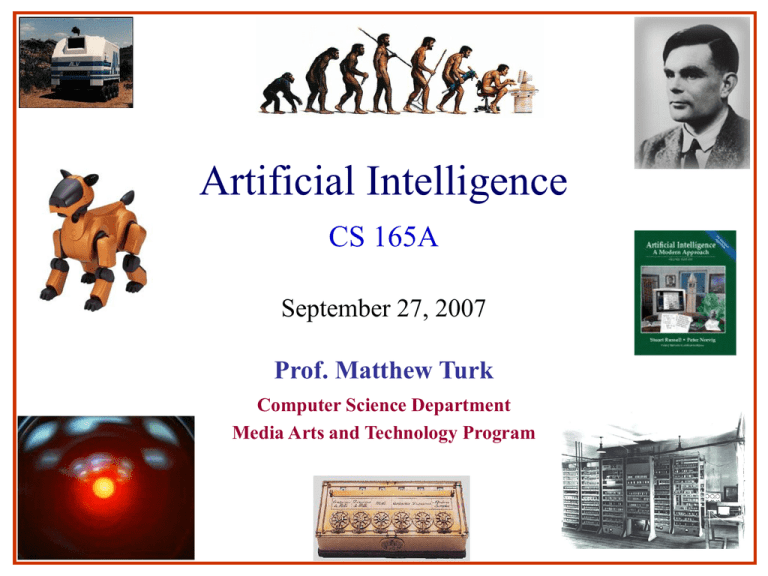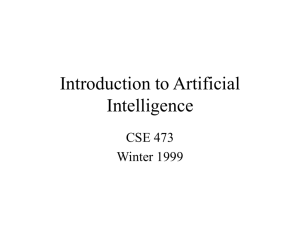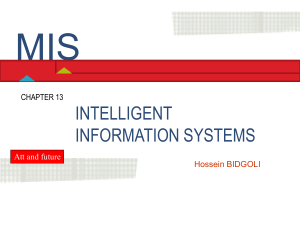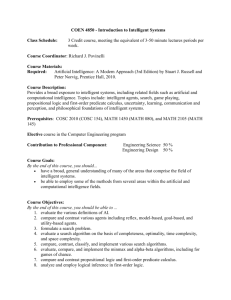Artificial Intelligence CS 165A September 27, 2007 Prof. Matthew Turk
advertisement

Artificial Intelligence
CS 165A
September 27, 2007
Prof. Matthew Turk
Computer Science Department
Media Arts and Technology Program
What is Artificial Intelligence?
• AI in the media
– Popular movies
2001: A Space Odyssey
Star Trek
Star Wars
The Terminator
The Matrix
– Popular press, novels
• Often portrayed as
– A property of evil computers
– Computers doing impossible things
• Public view
– Books and movies have inspired many AI researchers
– Books and movies have raised the public’s expectations
2001: A Space Odyssey
• HAL was “born” on January 12, 1997 in Urbana, Illinois
– January 12, 1992 in the film
• What does HAL do?
–
–
–
–
–
–
–
Plays chess
Talks, converses
Has common sense
Sees
Appreciates art
Lipreading
Has feelings, emotions
What is Artificial Intelligence? (cont.)
“The science and engineering of making intelligent machines, especially
intelligent computer programs.”
“The business of getting computers to do things they cannot already do, or
things they can only do in movies and science fiction stories.”
“The study of how to make computers do things at which, at the moment,
people are better.”
“The design of flexible programs that respond productively in situations
that were not specifically anticipated by the designer.”
“The construction of computations that perceive, reason, and act
effectively in uncertain environments.”
“The branch of CS concerned with enabling computers to simulate such
aspects of human intelligence as speech recognition, deduction,
inference, creative response, the ability to learn from experience, and
the ability to make inferences given incomplete information.”
“Modeling aspects of human cognition on computers”
“What AI people do”
Herb Simon
John McCarthy
Marvin Minsky
Allen Newell
Seminal event for AI as a field, in 1956:
The Dartmouth Summer Research Conference on Artificial Intelligence
“We propose that a 2 month, 10 man study of artificial intelligence be carried out
during the summer of 1956 at Dartmouth College in Hanover, New Hampshire.
The study is to proceed on the basis of the conjecture that every aspect of
learning or any other feature of intelligence can in principle be so precisely
described that a machine can be made to simulate it. An attempt will be made to
find how to make machines use language, form abstractions and concepts, solve
kinds of problems now reserved for humans, and improve themselves. We think
that a significant advance can be made in one or more of these problems if a
carefully selected group of scientists work on it together for a summer.”
Goals of AI
• Scientific
– To understand the principles and mechanisms that account for
intelligent action
To create models and mechanisms of intelligent action
• Engineering
– To design intelligent systems that can survive and operate in the
real world and solve problems of considerable scientific difficulty
at high levels of competence
To understand and build intelligent systems
Intelligent systems
• An intelligent system is characterized as one that can:
–
–
–
–
–
–
–
Exhibit adaptive, goal-oriented behavior
Learn from experience
Use vast amounts of knowledge
Exhibit self-awareness
Interact with humans using language and speech
Tolerate error and ambiguity in communication
Respond in real-time
What AI people study
•
•
•
•
•
•
•
•
•
Logic
Knowledge representation
Search
Reasoning/inference
Non-monotonic reasoning
Planning
Probabilistic reasoning
Naïve physics
Machine learning
•
•
•
•
•
•
•
•
•
… and more…
Speech recognition
Natural language processing
Computer vision
Pattern recognition
Intelligent agents
Robotics
Neural networks
Data mining
Expert systems
What AI people (and programs) do
• Prove theorems
• Emulate/model human
cognitive abilities
• (Attempt to) solve
exponentially hard problems
• Build expert systems for
diagnostic tasks (e.g, medical
diagnosis, error analysis)
• Build robots
• Build machine vision systems
for industrial tasks,
surveillance, consumer apps,
etc.
• Create speech recognition and
understanding systems for
various domains
• Process text to { understand,
summarize, correct, respond,
etc. }
• Create data mining systems to
process very large amounts of
information (e.g.,
bioinformatics)
• Build intelligent agents to look
and act in socially useful ways
• Develop computer games
… and more…
Some notable AI systems
• IBM’s Deep Blue
– Beat world chess champion Gary Kasparov in 1997
– Kasparov vs. (Israeli-built) Deep Junior, January 2003 (ended in a draw)
– Kasparov vs. X3D Fritz, November 2003
• Expert systems
– Medical diagnosis
A computerized Leukemia diagnosis system did a better job checking
for blood disorders than human experts
• Speech recognition
– Commercial systems by Dragon, IBM, and others
– Phone-based systems (e.g., airline reservations)
• Automatic scheduling for manufacturing operations
• User interface
– Grammar and spelling checkers, automated help
Some notable AI systems (cont.)
• Data mining
– Fraud detection, credit scoring, customer profiles and preferences, genome
analysis
• Cyc
– Doug Lenat’s 18-year old project to give computer common sense
• Computer vision
– E.g., “Hands Across America” 1995
– Face recognition systems for biometrics
• Robotics
– Mars Rover, robots for hazard environments, factory automation
– Sony, Honda, others: robot pets
– CMU Navlab drove across country (2797/2849 miles)
1980s – DARPA ALV Program
– DARPA Grand Challenge, Urban Challenge
http://www.darpa.mil/grandchallenge
DARPA Grand Challenge (2004, 2005)
“DARPA intends to conduct a challenge of autonomous ground vehicles
between Los Angeles and Las Vegas in March of 2004. A cash award of $1
million will be granted to the team that fields the first vehicle to complete
the designated route within a specified time limit.”
Terrain between LA and Las Vegas
DARPA Urban Challenge 2007
Perspectives on AI / Disciplines involved
• AI functions as a channel of ideas between computing and
other fields, ideas that in fact have profoundly changed
those fields
–
–
–
–
–
–
–
–
–
Logic
Mathematics
Statistics
Philosophy
Psychology
Linguistics
Neuroscience
Computer science
Cognitive science
AI
Foundations of AI
• Philosophy
– Framed the ideas of AI
Dualism/materialism, logical/rational/empirical, causality,
consciousness, mind/body…
• Mathematics
– Formalized computation, logic, probability
– Possibilities and limitations of computation
• Psychology
– Experimental: the brain as an information processing device
(Cognitive Science)
• Computer Science and Engineering
– Algorithms
– Built real machines, Moore’s Law progress
AI and Computer Science
• AI is mostly about software (usually large and complex)
– Important: Algorithms, tools, complexity, etc.
• Early advanced in CS due to AI researchers include:
–
–
–
–
–
–
Search algorithms
List structures, pointers
Virtual memory
Dynamic memory allocation
Garbage collection
Logical programming
• CS 165A will be taught primarily from a CS perspective
– Not the only perspective, though
What is an AI Program?
• AI programs can generally be thought of as comprising
three separated parts
– Data / knowledge (“knowledge base”)
– Operations / rules (“production rules”)
– Control
Which rules to apply when
Selecting operations and keeping track of their effects
Typically defined by the search strategy
• Data and Operations should be modular and easy to
modify
An experiment...
Can only report what’s there
Perception
Data/knowledge
Operations/Rules
The World
Blind!
Effector
One at a time
Control
Goals of this course
• To teach you the main ideas of AI
• To introduce you to a set of key techniques and algorithms
from AI
• To help you understand what’s hard in AI and why
• To see how AI relates to the rest of computer science
• To get you thinking about how AI can be applied to a
variety of real problems
• To have fun
“Proper” background
• Blind search (depth-first, breadth-first)
– CS 130A
• Trees (programming)
– CS 20, 50, 130A
• Boolean logic, Propositional logic, First-order logic
– CS 40
• Probability, Bayes rule
– PSTAT 120A
• Parsing
– CS 20, 160 (some)
• C++ / Java
– several
UCSB CS AI Sequence: 165A and 165B
165A. Artificial Intelligence (Fall)
(4) TURK
Prerequisites: Computer Science 130A; open to computer science majors only
An introduction to the field of Artificial Intelligence, which attempts to understand and
build intelligent systems. Topics include AI programming languages, search, logic,
knowledge representation and reasoning, game playing, planning, uncertainty, perception,
and intelligent agents.
165B. Machine Learning (Winter)
(4) SMITH / SU
Prerequisites: Computer Science 165A
The course covers the most important techniques of machine learning (ML) and includes
discussions of: well-posed learning problems; artificial neural networks; concept learning
and general to specific ordering; decision tree learning; genetic algorithms; learning sets of
rules; Bayesian learning; analytical learning; and combining inductive and analytical
learning. The course integrates these approaches to learning with fundamental aspects of
machine intelligence (MI), including search, knowledge representation and reasoning, and
applications.
Course administrivia
• Web sites
– http://www.cs.ucsb.edu/~cs165a
Announcements, syllabus, schedule, lecture notes,
assignments, grades, related links
• Expectations
– Come to class, and come prepared
– Participate: Ask questions, offer insight, tell me I’m wrong...
– Think!
Reminders
• Peruse the course web site
• Join the mailman group
• Keep up with assigned reading
• Assignment #0 due Tuesday
• First discussion session next Wed. (3pm and 4pm)
– Review of relevant prerequisites: data structures, probability and
statistics, logic
– Info on using CSIL (if necessary)
• First “Thursday Quiz” next week




